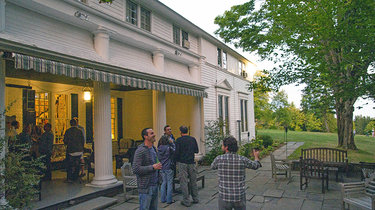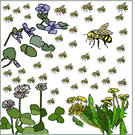Visionaries, muddy boots, and a century of global good
We learned some shocking news this week that led us to sift through pages of the past to tell the remarkable history of the institute in Rensselaerville.
At the time World War I was fought, it was thought to be the war to end all wars. The carnage of trench warfare was something humans had never experienced. Forty million casualties — both wounded and dead, half soldiers and half civilians — resonated even in places like bucolic Rensselaerville.
Laura Talmage, an artist and the wife of Frank Huyck Jr., started a series of meetings in Rensselaerville in 1924, mindful of preventing another such war. Leaders in economics and education, in history and labor came to the Country Forums on Human Relations.
Pacifist and socialist Norman Thomas was among those attending the country forums and so was Margaret Sanger, the birth-control advocate. The goal was to find ways to peacefully solve problems and resolve differences.
Related: Carey Institute listing its campus for sale, hopes to continue work
These talks, orchestrated by a middle-aged woman, were the start of the storied institute in Rensselaerville. Talmage died in 1958 but her daughter, Katharine, with her husband, Probien Lee Elmore, together with friends Winifred and Everett Clinchy picked up the work in another tumultuous time.
The Elmores had inherited Stonecrop, a sprawling country home, and the Clinchys bought the nearby Edmund Huyck House; they donated their homes and the 100 or so acres of surrounding land to what became the Rensselaerville Institute.
In 1963, it was chartered by the State University of New York and named The Institute of Man and Science, attracting luminaries like United Nations Secretary General U Thant as well as ambassadors to the United Nations and experts on space and science, on history and philosophy. Science fiction writer Isaac Asimov became a regular visitor.
The first world conference to make the environment a major issue, the United Nations Conference on the Environment in Stockholm, held in June 1972, was partly planned in Rensselaerville.
In 1971, technology went on trial as Louis Nizer played the role of judge while those in the mock courtroom investigated the control and direction of technology at the dawn of the computer age.
A conference on nuclear proliferation held at the institute drew Jacques Cousteau and Jimmy Carter.
In 1983, after several strong women objected to the “man” in its name, the organization became The Rensselaerville Institute. In 1926, Katharine Huyck herself had shocked Albany society when she walked unescorted to the altar on her wedding day. According to her Enterprise obituary, she “refused to be handed from the arm of one man to another.”
The institute became known as “the think tank with muddy boots” when, in the 1970s, it switched its focus to learn how self-help could restore a community psychologically as well as physically. The institute, in 1973, bought, for $125,000, a dying company town — Stump Creek, Pennsylvania — with the idea of helping the remaining residents — most were on the verge of abandoning it — rejuvenate the community.
The institute went on to do the same thing in Corbett, New York, and then, in the 1980s, began a self-help program with the Cherokee town of Bell in Adair County, Oklahoma, and published “The Self-Help Handbook” for community projects. The self-help philosophy was used for government offices and not-for-profits and even for low-performing schools.
Over the decades, The Altamont Enterprise has covered many of these initiatives, including the institute’s most recent transition to the Carey Institute for Global Good, which we wrote in 2014 “has its feet on the ground and its head in the clouds.”
The land had been purchased by William Polk Carey, a trustee of the institute for 20 years. He was the founder of W. P. Carey & Co., a real-estate financing firm, who died in 2012 just before the sale was announced.
We wrote in 2014 about the lofty goals its new director, Carol Ash, had in mind, comparing the institute’s future direction to Yaddo, a well-known artists’ retreat in Saratoga Springs. The Carey Institute eventually teamed up with the Logan Foundation, providing support and a safe haven for creators of long-form journalism — books, films, and more.
Carey’s wish had been to see the institute’s original heritage — back to Laura Talmage’s Country Forums on Human Relations — for global understanding to continue but also to support the local community. Among the local projects, a brewery was established on the campus and, with help from the United States Department of Agriculture, knowledge gained there was shared with farmers and breweries throughout New York State.
While Ash, along with her husband, journalist Josh Friedman, remain on the institute’s board of trustees, she passed the leadership role to her son-in-law, Gareth Crawford.
What we learned this week is that, due in part to struggles caused by the pandemic shutdown, the Carey Institute for Global Good is putting its 100-acre campus up for sale. We first heard of plans for the sale from Ellen Rooney whose family has a house on the edge of the campus that a developer expressed interest in buying this summer.
He was interested in using the campus as a high-end wedding venue, holding two or three weddings a week, and as a conference center, Rooney said. He has developed such venues in Brooklyn where he lives and also at Stone Ridge about a two-hour drive from New York City.
Ellen Rooney along with her sisters and brother share ownership of the home, on about six acres, adjacent to the institute’s campus, left to them by their parents, Andy Rooney, of “60 Minutes” fame, and his wife, Marguerite.
Ellen Rooney said the home had been in her family for almost 90 years, having originally been owned by her mother’s parents. She has many fond memories of her grandparents and parents at the house and her extended family has gathered for Christmasses there for more than 20 years.
The developer has told the Rooneys he will not proceed with buying the 100-acre campus from the institute unless the Rooneys agree to sell their house to him or give him first refusal, she said.
“Because we aren’t full-time residents, I strongly feel it should not be up to my own family to decide this …,” Ellen Rooney told us. “People in town should know about it and have input,” she said, noting that the town has essentially subsidized the institute to some degree since it pays very little in taxes.
We’re glad she spoke up because one of the great strengths of the institute has always been the way it has drawn from the community. It is the largest employer in town and has one of the most valuable pieces of property.
The sale could be good for the town, bringing in tax revenue and jobs, or it could be problematic, increasing noise and traffic with visitors that may have little intersection with the community.
We’ve written as much as we could find out about a potential sale in a front-page news story so that the community can, indeed, be informed. (After we talked to the institute’s president, Crawford, on Monday, the institute put out a press release on Tuesday, more than a month after the trustees had voted to list the property for sale.)
We also spoke with Mark King, the executive director of the Mohawk Hudson Land Conservancy, an organization that is in the very earliest stages of seeing if it would be possible to secure a conservation easement for the property.
We’re glad the conservancy is involved and we were relieved when Crawford told us the intention is to sell the property with an easement in place. That is as it should be since one of the core values of the institute has been environmental protection.
We are sad that the institute is considering a sale since so much of its appeal has been as a retreat where the campus itself offers its own kind of support. We sincerely hope the institute continues with its worthwhile work. After all, Talmage started the dialogues without the benefit of a campus.
Global good is an ideal worth pursuing.


